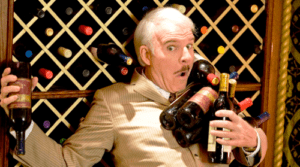
Not Louis Pasteur
Sorry to give this post such a grim title, but oxidation is really not a very happy subject for me. I’d rather be writing about something more positive, but that wouldn’t be doing you any favors. Every home winemaker needs to learn about the harsh realities of wine oxidation. If not for any other reason, so that they can learn how to avoid it.
Louis Pasteur, the father of modern microbiology, once said: “Oxygen is the greatest enemy of wine”. He may have been right. We see oxidation inflicting way too many homemade wines… needlessly.
WHAT IS OXIDATION?
In its strictest terms, oxidation is a chemical reaction between the oxygen in the air we breath and the phenolic compounds in your wine. Phenolic compounds are the “organics” of your wine. It’s the stuff that makes up the wine’s color, flavor and bouquet — the wine’s heart and sole.
As oxygen comes in contact with these phenolic compounds it deteriorates them along with everything they represent to the wine. As a result, a wine that becomes oxidized will take on a brownish or orange tinge to its color. Its flavor will become flat or more one dimensional with no fruity notes. And, its aroma will be mostly that of raisins or caramel. In extreme cases, the wine can even develop unpleasant off-flavors and aromas.
WHO HAS THE MOST PROBLEMS WITH OXIDATION?
Almost all the cases we see are wines made from fresh fruits: grapes, berries, apples, etc. as opposed to wines made from concentrates or wine ingredient kits. This is partially because of the way the ingredient kits are set up, but it’s also because of the great directions that come with these kits. The directions keep you on the straight-and-narrow, so to speak — keeping you away from oxidation without you even realizing it.
So the good news is, if you make wine using wine ingredient kits, follow the directions, and oxidation will not be of much concern to you. The bad news is, if you make wine from fresh fruit, oxidation needs to be your concern. You need to understand it and know what causes it so that you can avoid it. If not your wine could fall victim to this ‘disease’ called wine oxidation and ‘die a slow death.’
In part II of the is two part blog we go over the meat-and-potatoes of avoiding oxidation. You’ll discover that with just a few simple precautions and maybe a minor change or two in your winemaking procedures, you’ll be able to eliminate any chance of oxidation in your precious homemade wines.
———————————————————————————————————
Ed Kraus is a 3rd generation home brewer/winemaker and has been an owner of E. C. Kraus since 1999. He has been helping individuals make better wine and beer for over 25 years.

Thank you for the info.I guess that you can tell from my recent orders that I am getting ready to tackle my first batch of wine the right way. Thanks again, Don